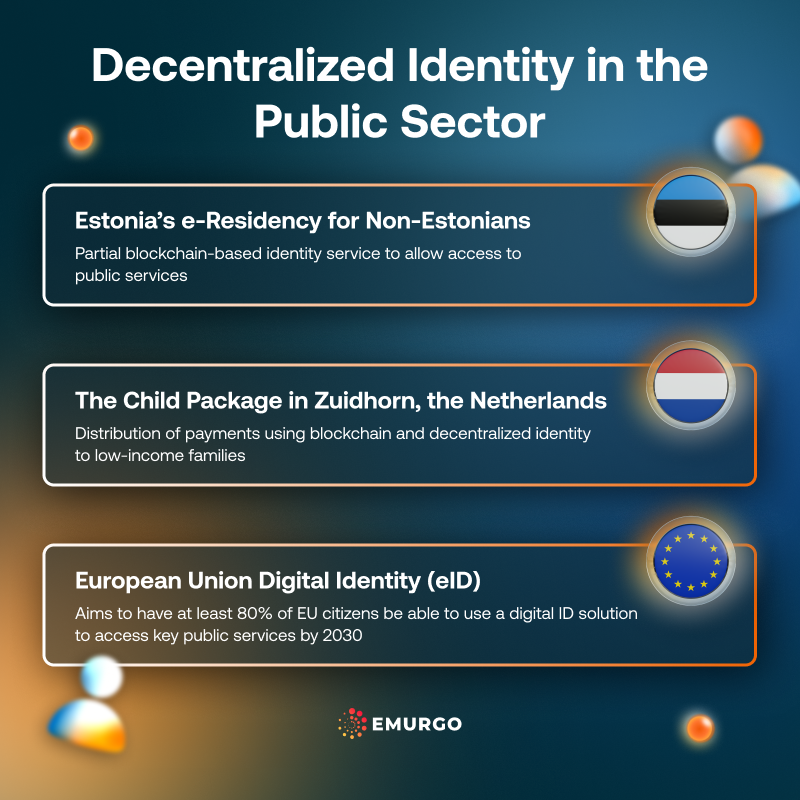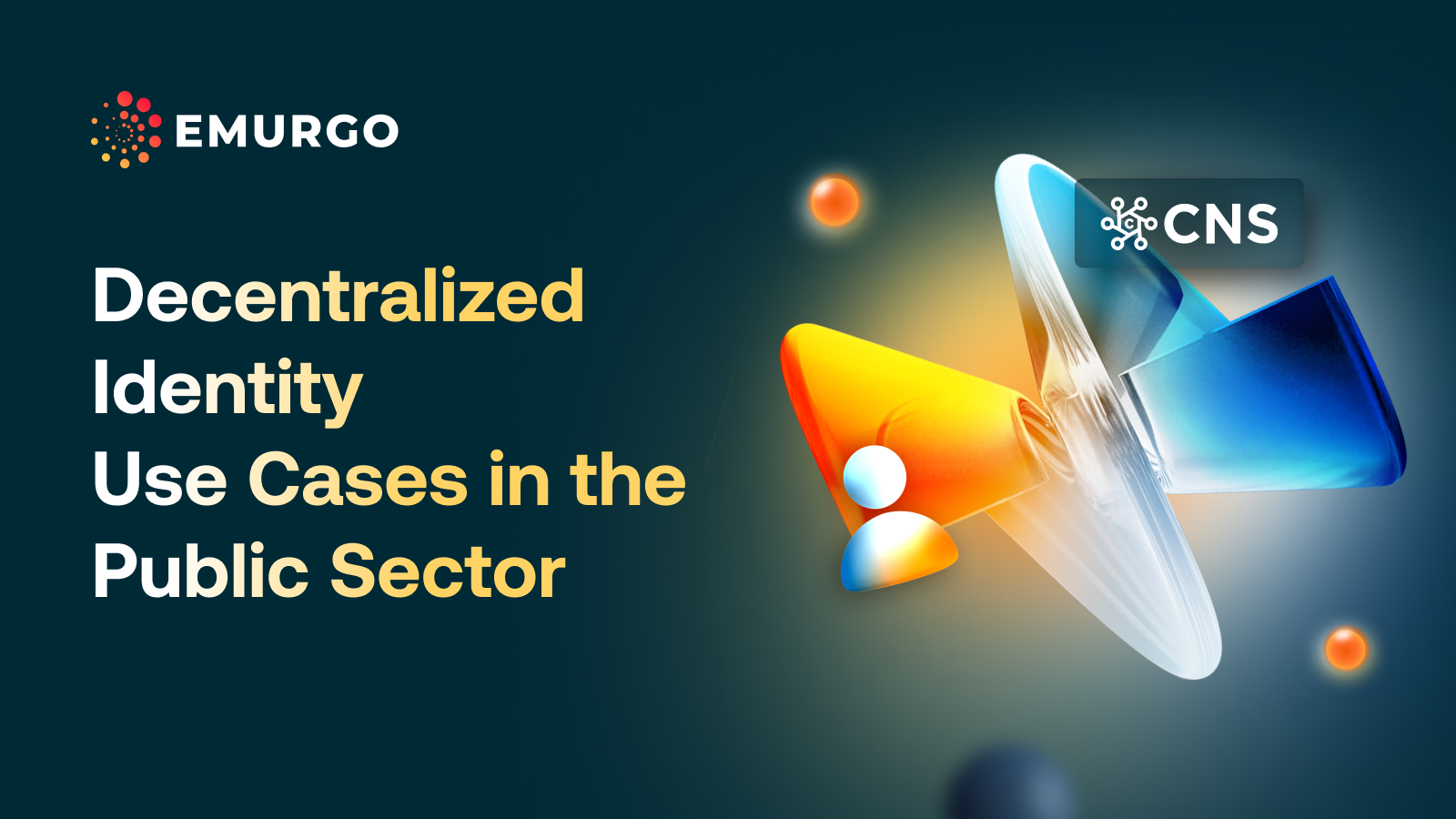EMURGO’s blog series on decentralized identity has explored its unique value proposition to securely manage and store personal data using blockchain technology.
While some governments can be bureaucratic, the expanding awareness of the benefits of decentralized identity solutions and blockchain has led to more discussions around creating regulatory clarity for its usage in the private and public sectors.
This blog looks at how decentralized identity solutions are being applied in the public sector and their impact.

The public sector is becoming a digital space where most services provided by governments are distributed over the Internet. This change has led public institutions to realize that they no longer necessarily control identity and that, in some cases, they rely on private providers for this information.
The result is that a debate has sprung in several nations on what should be the role of governments in this age of digital identity.
The digitization of governmental services has resulted in the need to provide citizens with an accessible digital identity.
Yet, digital identity cannot follow a top-down approach as used in the past, as it constantly changes and requires updates that would be difficult using a centralized model.
This is why some governments today are experimenting with decentralized identity.
Let’s review some examples:
Estonia’s e-Residency
In Estonia, there is a partial blockchain-based e-Residency program which represents a national ID-card system currently operating in the European Union.
This ID card allows people access to certain basic and public e-services.
The e-residency is different from the national residency for those born in Estonia. The e-residency is for foreigners looking to have a base of operations to interact with some services inside the EU.
Estonia’s e-Residency represents a potentially viable model for a more complete decentralized identity system that is applied at a national level. This has served as a case study for EU officials who are actively looking to include decentralized identity in the EU.
Related reading:
- Decentralized identity in the Cardano ecosystem
- How decentralized identity solves user privacy issues
- Why decentralized identity can fix the internet
The Child Package
Child Package, a blockchain project of the municipality of Zuidhorn, Netherlands, provides a set allowance per year to certain families facing financial difficulties.
These payments are distributed using blockchain technology and it is used to track all the transfers for those in the program.
Additionally, each recipient of the service is also given a decentralized identity which is used to track their use of the service.
Finally, it’s also planned that in the next version of the program, zero-knowledge proofs might be used to transmit personal information between the beneficiary and the government agent.
European digital identity (eID)
Perhaps the most ambitious and promising of all the developments in decentralized identity is the EU’s eID. It aims to have at least 80% of EU citizens be able to use a digital ID solution to access key public services by 2030 leveraging many technologies.
The effort is based on creating a unified model to create a digital identity for all EU citizens and also a wallet that can hold this identity. The wallet would also be able to interact with all services provided by the EU and its member nations.
This effort is a multinational one that will take some time to materialize. Yet, it has already drawn interest from the industry such as Hyperledger Arias and Indy coupled with the European Blockchain Services Infrastructure (EBSI).
The EBSI consists of a peer-to-peer network of interconnected nodes running a blockchain-based services infrastructure. This platform would be serviced by all the members of the EU and also would connect to other blockchain networks.
One of the main use cases would be the EU’s eID which will function on top of this shared infrastructure. The infrastructure is open-source and also supports a series of wallets that can connect to the network, for individuals and organizations alike.
As we can see, despite moving slower than the private sector, the public sector is gradually planning the adoption of blockchain technology for certain services such as the need to create a digital identity and digitize government services.
Cardano Connect (CNS) is a decentralized identity project built for the Cardano ecosystem. It is focused on initially providing customized .ada domains for users to represent Cardano wallet addresses. CNS’ platform empowers users to create and manage secure social profiles on Cardano with .ada domains minted as NFTs acting as a form of decentralized identity.
These customized domains can be used as ADA wallet addresses to transact, and manage user reputations within the Cardano ecosystem, as well as user profile information.
Read more: How to use custom wallet addresses in Yoroi
Yoroi, an open-source Cardano wallet, has integrated and supports Cardano Connect’s .ada extensions for users.
Want a simple way to receive content on blockchain use cases and other Cardano blockchain-related news?
Then, follow EMURGO on X to receive more updates including decentralized identity content.
About EMURGO
- Official Homepage: emurgo.io
- X (Global): @EMURGO_io
- YouTube: EMURGO channel
- Facebook: @EMURGO.io
- Instagram: @EMURGO_io
- LinkedIn: @EMURGO_io
Disclaimer
You should not construe any such information or other material as legal, tax, investment, financial, or other advice. Nothing contained herein shall constitute a solicitation, recommendation, endorsement, or offer by EMURGO to invest.



